Clive Myrie: Becoming host of Mastermind is a big, big job
- Published
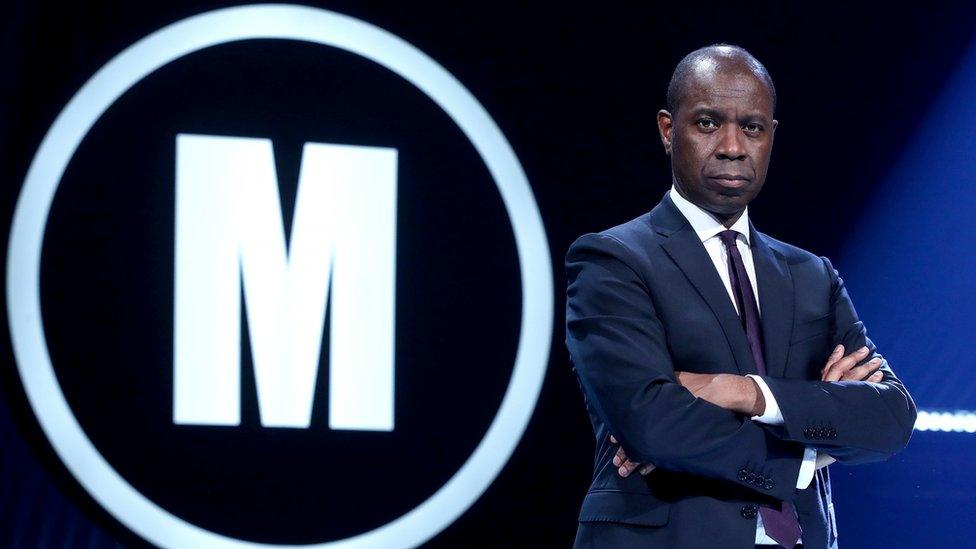
Myrie's first episode of Mastermind as host airs on Monday 23 August
It's hard to imagine BBC News journalist Clive Myrie being fazed by any unfamiliar situation.
In a career spanning three decades he's travelled the world as a foreign correspondent, confronting war, death and misery in all their unpalatable guises, while maintaining a face of control and calm. The same is true of his delivery when hosting BBC One's flagship news bulletins.
Of course, composure comes with the job, yet his dispatches from the NHS frontline of the fight against Covid won him two Royal Television Society Journalism awards for his "versatile, measured, compelling, relaxed but reassuring" style.
Now, finding himself in uncharted waters as he takes over as Mastermind host from John Humphrys, who oversaw the BBC Two quiz show for 18 years, he discloses feeling "trepidation".
"It's an icon of British TV, and it's being entrusted into my hands," says Myrie. "It's a big, big, big job and obviously I'm following the footsteps of John Humphrys, who has been brilliant for so many years, so yes, there's a level of trepidation.
"But there's also excitement, it's a new venture and the show is something I grew up watching so for me to be part of that now is fantastic."
After almost 50 years on our screens, Mastermind is still widely considered one of the toughest TV challenges, one where the "contenders" battle to assert their intellectual authority.
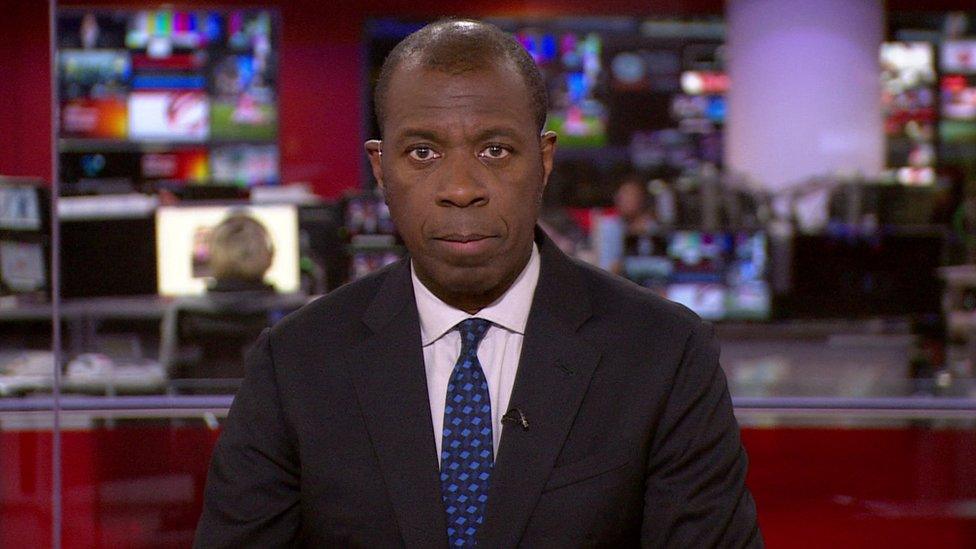
Myrie can regularly be seen presenting BBC One's flagship news bulletins
The concept sounds simple enough. First answer questions on your specialist subject followed by another set on general knowledge. Whoever earns the most overall points goes through to the next round.
But since its genesis was inspired by the interrogations endured as a prisoner of war by its creator Bill Wright, taking part was never going to be an easy ride.
The pitch black of the studio, the glaring spotlight, ominous leather chair and a theme tune entitled Approaching Menace tell all. Then there are the hours of swotting needed (three specialist areas in the hope of making it through to the end). Whichever way you look at it, it's a vast mountain to climb.
None of this puts off young and old from applying though. And, as Myrie called out earlier this year on Twitter, external for "passionate" people to step up, undaunted they obliged, he says.
The champion of the last series was Jonathan Gibson, who at 24 was the youngest winner to date. His specialist subjects were Agatha Christie's Poirot, William Pitt the Younger, and Flanders and Swann.
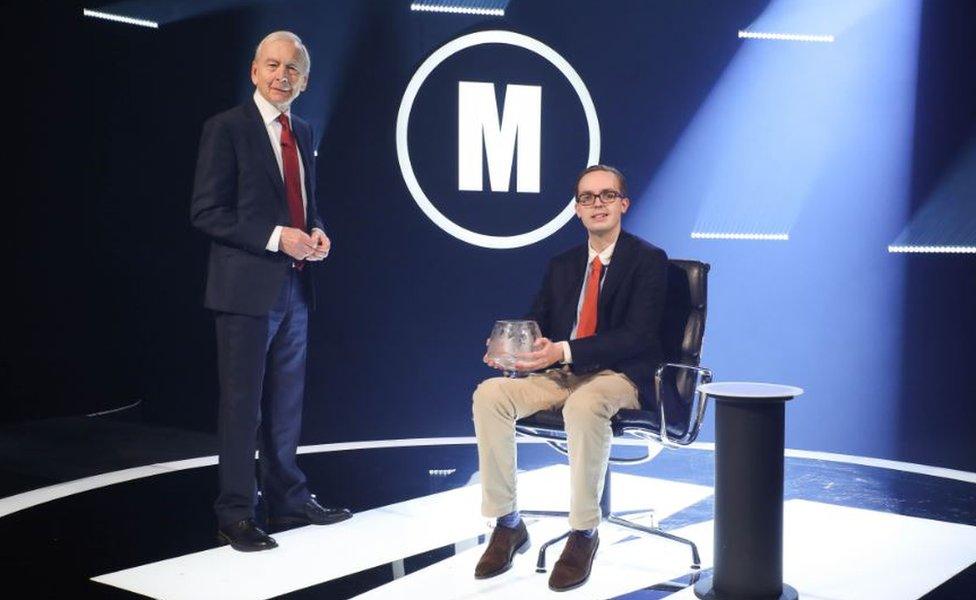
John Humphrys and the last series champion Jonathan Gibson
Hoping to emulate his success, this year's contenders have wowed Myrie with their knowledge.
"The subjects have been so wide-ranging from the Grand Tour cycling races to the flora and fauna of the Galapagos Islands," he says.
"Then, the history of the Rebecca Riots, a peasant uprising in Wales. I'm learning so much and I hope the public will learn a little bit too," he says.
Allow X content?
This article contains content provided by X. We ask for your permission before anything is loaded, as they may be using cookies and other technologies. You may want to read X’s cookie policy, external and privacy policy, external before accepting. To view this content choose ‘accept and continue’.

As for sitting in the infamous chair himself, he says: "I'm sincerely hoping that I will never put myself in that position."
But at a push, his specialist subjects would be jazz, which he's loved since childhood; opera and classical music could also be on the agenda, along with the US presidency as an institution, about which he gleaned plenty from his time in Washington as a correspondent.
For all the show's seriousness, Myrie wants his new role to show his lighter side.
"It's so nice to be allowed to open one's wings a bit wider than in the normal news format, and I'm very pleased that the public will get the opportunity to see another side of me," he says.
"I've done two editions of Have I Got News For You and Would I Lie To You, and I've just finished Celebrity Antiques Roadtrip. There is a lighter, more fun side to me that goes beyond the doom and gloom of daily news."
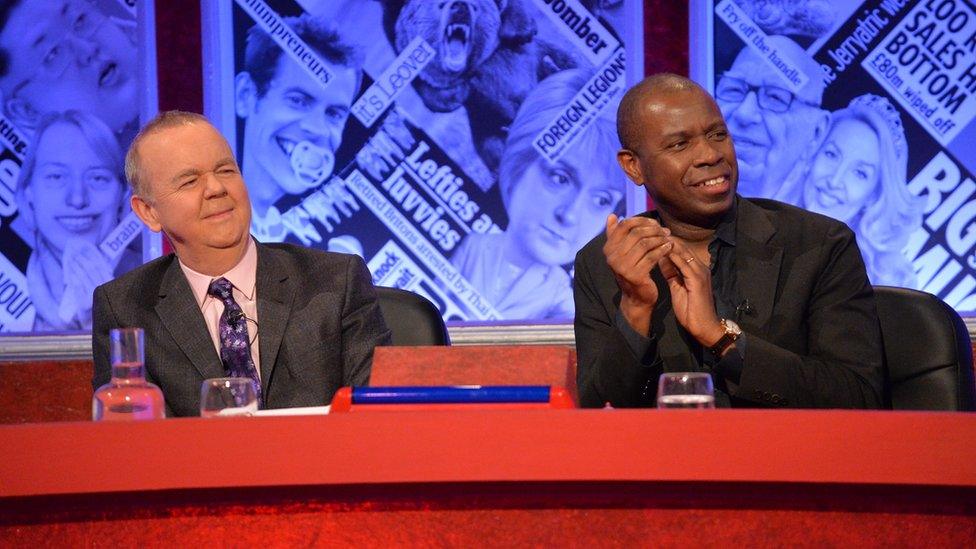
Clive Myrie showing his lighter side on Have I Got News For You alongside Ian Hislop
The show will also allow Myrie to indulge in his enthusiasm for meeting new people, one of the main reasons he became a journalist, he says.
"Partly I wanted to travel, partly to learn about the rest of the world, having grown up in a town in Lancashire, and I also did it to meet people.
"Translating my experience into Mastermind will be really interesting as I will be able to see a whole range of people wanting to do well, to try to understand their hopes, their dreams, their fears, their issues, which you can pick up even while you're sitting there asking someone questions.
"These people will possibly also learn a thing or two themselves - about who they are and how they handle pressure and the spotlight."
Myrie, the son of Caribbean parents, grew up in Bolton, Lancashire and his desire to go into journalism was with him from an early age. After completing a law degree, he won a place on the BBC's journalism training course.
His inspiration came from two sources on TV: the travel documentaries of Alan Whicker, and the news reports of Sir Trevor McDonald.
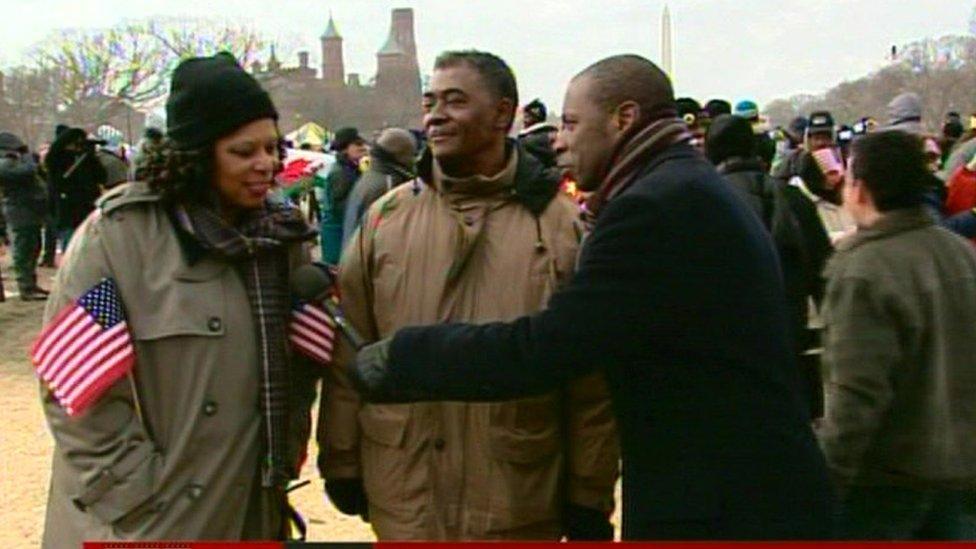
Clive Myrie says a highlight of his career was reporting on Barack Obama's US presidential win
Sir Trevor was the only black reporter Myrie came across on TV. He saw that as an opportunity rather than an obstacle, but was also aware he could be pigeonholed by editors for his race.
"Trevor on ITV News, he obviously looks the same as me and he seemed to be having a good time travelling around the world, meeting new people and experiencing new things and I thought so maybe I could do that," says Myrie.
"But at the beginning I said to the BBC I didn't want my career defined by my colour so I didn't particularly want to be going down to Notting Hill all the time to cover Carnival and that kind of thing.
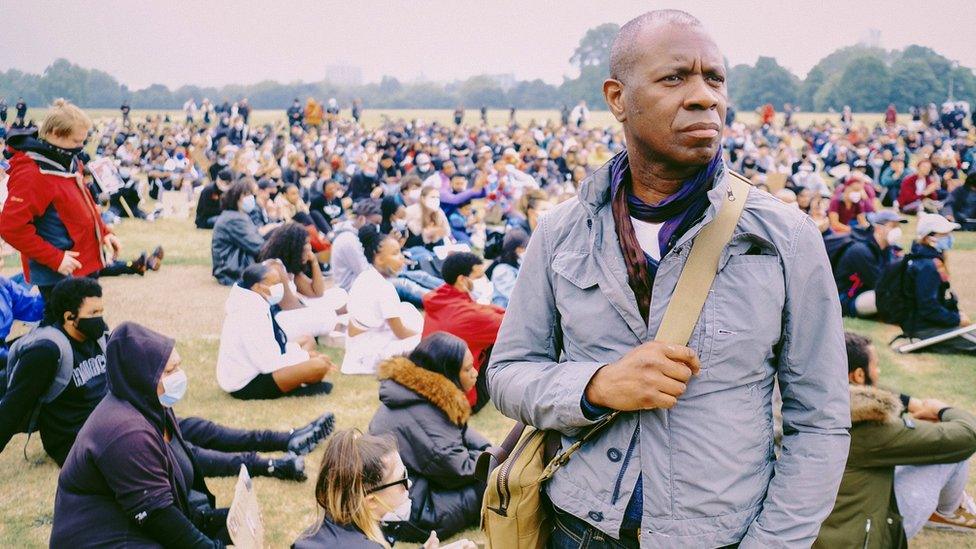
Clive Myrie reported for Panorama on the outcry over the murder of George Floyd
"They listened and my first posting as a foreign correspondent was to Japan and there aren't many black people there. I think that has helped me down the years because I hope that when the public see me reporting on a story they don't see a black journalist, they just see Clive Myrie and that's the important thing.
"Having said that, I will be the first journalist now to put up my hand to cover the situation in South Africa or Barack Obama becoming the first black US president or the death of George Floyd."
Reporting on the US presidential triumph of Obama was in fact one of Myrie's proudest moments yet, he says. "It was history and that's the thing about journalism - you get a ringside seat at so many major historical moments and that was one of them. I will never forget that experience."
However, being in the public eye has not come without cost. Myrie has been subjected to vicious racial abuse over the years, including from a far-right extremist, who was jailed in 2019 for threatening to kill him, external.
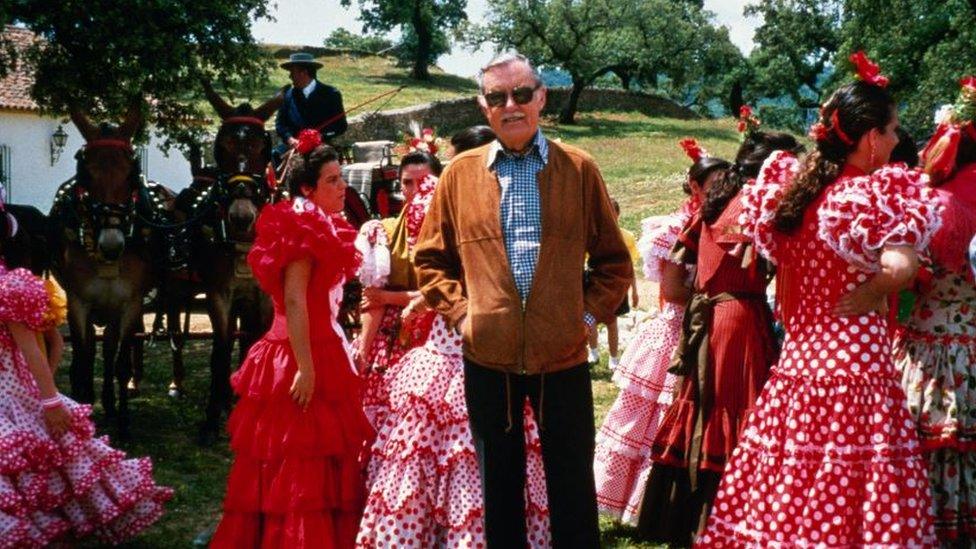
Alan Whicker's travel documentary series Whicker's World was an inspiration for Clive Myrie
His attitude to such attacks has become more pragmatic with age. "Youthful anger dissipates, and in fact all you end up feeling is pity for these people," he says.
"If all they've got in their lives is to contact me and tell me they don't like the fact that I happen to be black then that's a pretty sad state of affairs and reflection on their own lives."
Even with so much water under the bridge since Myrie was influenced by Sir Trevor, it's well known the lack of onscreen racial diversity still remains problematic. But Myrie says he's never considered himself a flag-bearer for change.
"If I'm seen as a role model, it's not by design, it's simply by example and Trevor McDonald was in exactly the same position, I suppose.
"If what I happen to be doing is something that encourages other people to feel a sense of self-worth and confidence that they can maybe get into journalism, TV or whatever and they happen to be black then that's a fantastic thing."
Clive Myrie will begin as host of Mastermind on Monday 23 August, at 19:30 BST on BBC Two and iPlayer.